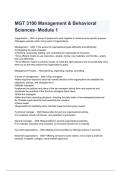MGT 3100 Management & Behavioral
Sciences- Module 1
Organization - ANS •A group of people who work together to achieve some specific purpose.
•Managers operate within many types of organizations.
Management - ANS 1.The pursuit of organizational goals efficiently and effectively.
2.Integrating the work of people.
3.Planning, organizing, leading, and controlling the organization's resources.
•To be efficient means to use resources—people, money, raw materials, and the like—wisely
and cost-effectively.
•To be effective means to achieve results, to make the right decisions and to successfully carry
them out so that they achieve the organization's goals.
Management Process - ANS planning, organizing, leading, controlling
4 levels of management - ANS 1)Top managers
•Make long-term decisions about the overall direction of the organization and establish the
objectives, policies, and strategies for it.
2)Middle managers
•Implement the policies and plans of the top managers above them and supervise and
coordinate the activities of the first-line managers below them.
3)First-line managers
•Make short-term operating decisions, directing the daily tasks of nonmanagerial personnel.
Ex: Donielle supervises the food assembly line workers.
4)Team leader
•Responsible for facilitating team activities toward achieving key results.
Functional manager - ANS Responsible for just one organizational activity.
•For example, director of finance, vice president of production.
General manager - ANS •Responsible for several organizational activities.
•For example, executive vice president, an executive director for a nonprofit.
For-profit organizations - ANS •Making money (profits) by offering products or services.
Nonprofit organizations - ANS •Offering services to some clients, not to make a profit (for
example, hospitals, colleges, social-welfare agencies).
, Mutual-benefit organizations - ANS Aiding members in order to advance their interests (for
example, political parties, farm cooperatives, labor unions, trade associations, clubs).
THREE TYPES of MANAGERIAL ROLES - ANS 1. Interpersonal roles: •Interact with people
inside and outside their work units. •Figurehead, leader, liaison.
2. Informational roles: •Receive and communicate information. •Monitor, disseminator,
spokesperson.
3. Decisional roles: •Use information to make decisions to solve problems or take advantage of
opportunities.
Entrepreneur, disturbance handler, resource allocator, negotiator
The manager's roles: Mintzberg's useful findings - ANS 1.A manager relies more on verbal than
on writtencommunication.
2.A manager works long hours at an intense pace.
3.A manager's work is characterized by fragmentation, brevity, and variety.
The SKILLS EXCEPTIONAL MANAGERS NEED - ANS 1. Technical skills: The job-specific
knowledge needed to perform well in a specialized field.
2. Conceptual skills: The ability to think analytically, to visualize an organization as a whole and
understand how the parts work together.
3. Human skills (soft skills): The ability to work well in cooperation with other people to get things
done; the ability to motivate, to inspire trust, to communicate with others.
CHALLENGES to BEING an EXCEPTIONAL MANAGER - ANS 1.Managing for competitive
advantage.
2.Managing for information technology.
-Ex: John wants his salespeople to use Salesforce.com to improve their sales
3.Managing for diversity.
4.Managing for globalization.
5. Managing for ethical standards.
6. Managing for sustainability.
7. Managing for happiness and meaningfulness.
Competitive advantage - ANS •The ability of an organization to produce goods or services more
effectively than competitors do, thereby outperforming them.
Having a competitive advantage means:
1.Being responsive to customers.
2.Innovation: finding ways to deliver better goods or services.
3.Quality: making improvements in quality so that consumers choose your product.
4.Efficiency: overstaffing and overuse of raw materials can make you less competitive.
MANAGING for INFORMATION TECHNOLOGY - ANS •By 2019, consumers worldwide are
projected to spend $3.55 trillion online, double that of 2015.




